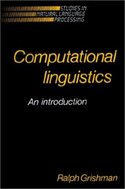Information Extraction: Knowledge Discovery from Text: Difference between revisions
From HLT@INESC-ID
No edit summary |
mNo edit summary |
||
| Line 18: | Line 18: | ||
== Abstract == | == Abstract == | ||
Much of the information on the Web is encoded as text, in a | Much of the information on the Web is encoded as text, in a form which is easy for people to use but hard for computers to manipulate. The role of information extraction is to make the structure of this information explicit, by creating data base entries capturing specified types of entities, relations, and events in the text. We consider some of the challenges of information extraction and how they have been addressed. In particular, we consider what knowledge is required and how the means for creating this knowledge has developed over the past decade, shifting from hand-coded rules to supervised learning methods and now to semi-supervised and unsupervised techniques. | ||
form which is easy for people to use but hard for computers to | |||
manipulate. The role of information extraction is to make the | |||
structure of this information explicit, by creating data base | |||
entries capturing specified types of entities, relations, and events | |||
in the text. We consider some of the challenges of information | |||
extraction and how they have been addressed. In particular, | |||
we consider what knowledge is required and how the means for | |||
creating this knowledge has developed over the past decade, | |||
shifting from hand-coded rules to supervised learning methods | |||
and now to semi-supervised and unsupervised techniques. | |||
[[category:Seminars]] | [[category:Seminars]] | ||
[[category:Seminars 2009]] | [[category:Seminars 2009]] | ||
[[category:Invited Presentations]] | [[category:Invited Presentations]] | ||
Latest revision as of 14:21, 20 May 2009
| Ralph Grishman |
 |
| Addresses: www mail |
Date
- 14:15, Monday, May 25th, 2009
- Room 336
Speaker
- Ralph Grishman, New York University, USA
Abstract
Much of the information on the Web is encoded as text, in a form which is easy for people to use but hard for computers to manipulate. The role of information extraction is to make the structure of this information explicit, by creating data base entries capturing specified types of entities, relations, and events in the text. We consider some of the challenges of information extraction and how they have been addressed. In particular, we consider what knowledge is required and how the means for creating this knowledge has developed over the past decade, shifting from hand-coded rules to supervised learning methods and now to semi-supervised and unsupervised techniques.